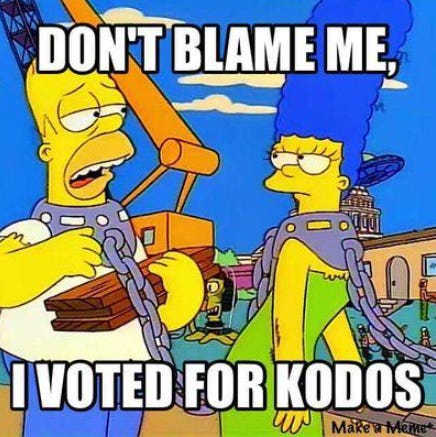Third Parties are ripe for ridicule and mockery. They promote kooky ideas, they show no sense of rationality, moderation or the ability to govern and carry with them the stench of failure. Far too often, they stake their claims on a rigid, absolute ideology which work on some issues but collaterally results in some horrible, perverse outcomes; when you point this out to them they usually shrug and go “Well, that’s just how it works.” Seldom do Third Parties at a national level catch fire, and when they do they are co-opted usually by one of the major parties.
For over 30 years now, the GOP has been successful in bringing in these Third Party elements into their camp. To be fair, some of these ideas that were better fits to Third Parties sprang up through the GOP primary system. For example:
Ross Perot’s quixotic campaign about the exploding deficits (fueled by Reagan and Bush) became GOP dogma. Even though they seldom do anything about it and usually exacerbate the problem, to say out loud otherwise is akin to hari kari.
In the same year, Pat Buchanan’s anti-immigrant crusade became a central plank in GOP orthodoxy. Gone were the days of Reagan’s immigration amnesty and creating a sound immigration policy and in were the only solutions of more walls, more border agents, more guns and zero immigration at all.
In early 2009, sparked by the bank bailouts of the housing collapse, the Tea Party movement began. The GOP latched onto and “astroturfed” a large number of groups in this movement and it shifted the GOP further to the right. The GOP became meaner, further detatched from reality, and further incapable of actually governing. Experienced thoughtful legislators were often primaried and lost to rabid kooks.
In 2015, Donald Trump’s campaign began. Whereas most campaigns like his are almost always Third Party ventures (indeed, the general consensus was before he announced that he would run as a Third Party candidate, and flirted with Perot’s “Reform Party” for some time in the early 2000s), he chose to create a lane for himself within the GOP, and succeeded. Over the course of the past 8 years, as GOP government officials, media professionals and sane political hacks fled the party, he’s fashioned the GOP structure into a single issue party, the cult of personality we have today.
And it’s this last item that gives me pause and makes me think of it more as a Third Party. Over the weekend, a new ABC/Ipsos poll came out showing these numbers: 53% of overall voters believe the indictments against Trump were legitimate and warranted, but only 20% of Republican Primary voters do. TWENTY PERCENT. It used to be when it came to the military, nuclear secrets, foreign policy and national security issues, all Americans were on the same page and took things seriously. A full 80% of GOP primary voters don’t care our most sensitive secrets (including nuclear weapons secrets) were left out in the open for anyone to view, and believe Trump over the actual facts of the matter. This is solidly in Third Party territory now.
Now, the GOP has some things still going for it. It has a national voter base, can compete everywhere, national fundraising apparatus and its elected officials are taken seriously by the national media (to an extent). It has its own messaging silo within the Fox News/NewsMax/ Breitbart universe and the loyalty of its base is hardcore solid. Outside of that though, all you see is further erosion. Independent voters align less frequently with GOP positions, the non-partisan news media are no longer giving GOP talking points free passes and outside of the deep south, candidates espousing far right wing ideology have routinely lost in 3 straight election cycles. National fundraising not associated with Trump continues to dry up. As the GOP gets smaller, the base of MAGA supporters becomes all that remains.
And isn’t that what Third Parties really are? Just a base of voters adhering to a single issue principle that spout stupid things, have no interest in actually governing or compromise and are just regional or minority in nature? For what it’s worth, the GOP will never appear like a Third Party so long as another party doesn’t emerge. However, I’m pretty sure the Whig Party thought the same way right up until it collapsed. If a viable alternative were to emerge (and no, the No Labels party and the Third Way party are not viable), then I think we could relegate the current GOP to where its proper place is; the dustbin of history.
PurpleAmerica’s Obscure Fact of the Day
The indictment of Trump on Friday was BRUTAL. It was detailed, descriptive of everything illegal Trump did, and comprehensive. It’s hard to see how he is not guilty reading just the facts lain out in the indictment. Which brings up the question, can Trump run from President from jail?
Well, as it turns out, we’ve already had a candidate run for President from jail. Eugene Debs, the candidate from the Socialist Party ran for President in 1920 from the Atlanta Penitentiary for speaking out against the WWI draft.
He received a little over 914k votes (3%) which is typical (even high) for usual Third Party votes. In 1920, Debs was the ultimate radical. He’d run for president on the Socialist Party ticket five times since 1900. He’d opposed U.S. involvement in World War I, believing the war only benefited arms manufacturers and business interests.
“They have always taught and trained you to believe it to be your patriotic duty to go to war and to have yourselves slaughtered at their command,” Debs said. “But in all the history of the world you, the people, have never had a voice in declaring war, and strange as it certainly appears, no war by any nation in any age has ever been declared by the people.”
He added emphatically: “The working class who freely shed their blood and furnish the corpses, have never yet had a voice in either declaring war or making peace. It is the ruling class that invariably does both. They alone declare war and they alone make peace.”
Under the Sedition Act of 1918, such words were treasonous. The act, an amendment to the Espionage Act of 1917, sought to silence those who spoke out about the war.1 At a trial that began one month after the WWI Armistice, it seemed likely Debs would be found not guilty until he took the stand and admitted to the very crime. He lost subsequent appeals which confirmed the conviction. In 1921, President Harding commuted his sentence to time served.
PurpleAmerica’s Cultural Corner
Generally, a lot of the discourse on Third Parties are not very objective and are usually taken from the perspective “iconoclasts good/mainstream bad.” Yeah, there is a lot not to like about the two party system we have, and its not a very good fit for everyone. I wish we had more options too, but compromise is a necessary component of governance, and Third Parties are not often the compromising type. Let’s highlight some of them.
For starters, there are the usual Third Parties that overlap with the fringes of the main parties. For instance, there’s the Socialists/Democratic Socialists, the Conservative Party, The Green Party, The Constitution Party and a few other offshoots of major parties that are just more extreme in their views.
The most consistently successful Third Party is usually the Libertarian Party. Libertarians generally believe in supporting individual liberties and less government entirely; less military, less regulation, smaller government altogether, more personal freedom. I tend to think of them as “organized anarchists.” They don’t like government but acknowledge it somewhat as a necessary evil within a system, whereas anarchists flat out want to tear the whole system down root and stem.
There’s the Natural Law Party, which has a base in more religious fundamentalism but is basically summed up as “Anything against ‘Natural Law’ they oppose.” So technology, abortion, transgenderism, and a slew of other issues don’t really mesh with this crowd. Think of a group wanting to turn the clock back to 1300 and I’d say that’s pretty close to this club.
There are the ones that spring from the middle of the electorate that try to capitalize on disdain for both the major parties. This is where you find the Alliance Party, the Independent Party, and current new parties The No Labels Party, Third Way Party and the United Party. In reality, they tend to be waffling and voters avoid them because they don’t make firm stances on issues. When they do get some traction, the major parties co-opt those issues for their own.
There’s the Reform Party which started under Ross Perot in 1992. This is kind of an amalgam of Third Party candidates that has shown some success in spots around the country pushing independent candidates. They have ballot access and a platform which is the biggest aid to a struggling Third Party bid, but no major overarching philosophy. When Jesse Ventura won the Governorship of Minnesota, he did so as a Reform Party candidate.
Lastly, there are a lot of “single issue” parties out there advocating for more attention to particular causes. For example, “Legal Marijuana Now” party is a pro-cannibis party working solely on that issue. The Veterans Party is one focused on bringing attention to Veterans causes. There are also a slew of regional parties focusing on local issues in this regard.
When do Third Parties find the most success? When the two major parties, or the two major party candidates, are disliked by a large contingent of the populace.
So kind of like what we are seeing for 2024 already.
PurpleAmerica’s Final Word on the Subject
Like what you are seeing here at PurpleAmerica? Share and Comment. Let your friends and family know! Forward us topics you’d like us to discuss! It’s am open community here.
Much of this section comes from a Washington Post article you can find here: https://www.washingtonpost.com/dc-md-va/2019/09/22/socialist-who-ran-president-prison-won-nearly-million-votes/






